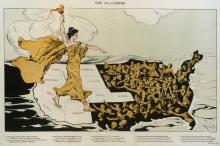Sexism

Megan Boyd wasn’t surprised when she first heard her child Daisy describe the phrase “your body, my choice” being used at school. Saddened, yes. Disappointed, absolutely. But for Boyd, the surge in misogynistic rhetoric following the election was just another sign of a growing boldness she’d seen in her New Hampshire town.

HAVE YOU EVER heard a sermon on Dinah? Have you read many commentaries on Hegai? In The Hero and the Whore: Reclaiming Healing and Liberation Through Stories of Sexual Exploitation in the Bible, Camille Hernandez, a trauma-informed educator and minister, interprets the narrative of these lesser-known biblical characters. She also reinterprets the stories of well-known figures — such as Eve, Rahab, and Potiphar’s wife — through the lens of sexual exploitation. For too long, stories of women in the Bible have been interpreted in religious cultures rooted in racism, sexism, homophobia, and transphobia. As a result, many Christians have stripped these characters of their agency and voice, demonized them, and sometimes ignored them altogether.
Hernandez provides language to reclaim our own narratives and process our own trauma. She encourages imagining a future where all people are safe and protected from sexual violence and other forms of oppression — both in the church and in society at large.

AFTER THE SOUTHERN Baptist Convention announced that women cannot be pastors, Sunday mornings have taken a new form across the nation. People are seeing the potential of an uninterrupted two-day weekend for the first time and relishing the freedom.
In clarifying its stand on women in leadership — that Baptists won’t stand for it — the SBC suddenly confirmed what groggy teenagers have been telling their parents for generations — namely, that sleeping in might be a better idea than attending a church where females are only needed for child care and potlucks.
In fairness, when the SBC committee — composed almost entirely of men — made the recommendation, it was mainly to free up parking. The SBC is the largest Protestant denomination in the country (high five!), and what better way to open more spaces than by telling half of humanity they’re not appreciated?

Do We Stay or Do We Go?
Women Talking centers on Mennonite women wrestling with how to respond to serial sexual assault by men from their colony. The film explores the complexity of forgiveness and touchingly reminds viewers that leaving one’s community can be an act of faith.
United Artists Releasing

THE OPENING SCENE of Holy Spider is brutal. We see a woman — a sex worker — leave her child at home to go to work. Walking through Iran’s holy city of Mashhad, she stops at a public restroom to adjust her headscarf and apply bold lipstick. She goes on her first call of the night and does some opium. As she prepares to go home, a man approaches on a motorcycle. He offers her money. She joins him. Shortly after arriving at their destination, he strangles her.
Writer-director Ali Abbasi’s Holy Spider is a fictionalized account of Saeed Hanaei, known as the Spider Killer, who targeted female sex workers in Mashhad from 2000 to 2001. The film, which premiered at the 2022 Cannes Film Festival, examines the killer’s life and the process of capturing him, led by (fictionalized) female journalist Arezoo Rahimi (Zar Amir Ebrahimi).

Wrestling with the complicated legacy of Christians and international adoption.

WITH THIS MONTH'S liturgical arc, we move from Epiphany to Lent: from a season of illumination to one of penitence. You’d think they would be reversed, though. You’d think it would be necessary to do the soul-searching first, to clean house before we get to invite God over for tea.
But the natural order of things always becomes topsy-turvy when God gets involved. God’s time “doubles back and loops around and ends up looking something like ... the name ‘Jeremy Bearimy’ in cursive English,” as Michael (Ted Danson) explains to Eleanor (Kristen Bell) in television’s The Good Place. The dot over Bearimy’s “i” represents Tuesdays, July, and “when nothing never occurs.”
Joking aside, this is the gift of the liturgical calendar: It lets us glimpse what it’s like to live in God’s time rather than our own. We don’t need to be worthy of an encounter with God before that encounter can happen because we constantly live in the kingdom space of already-not-yet. Revelation and repentance are like the proverbial chicken and egg: No one really knows which comes first, and it probably doesn’t matter in the end.
Divine time’s topsy-turvy nature is also why Christians are called to discern the difference between the “wisdom of this age” and God’s wisdom (1 Corinthians 2:6-7). What this month’s readings might call us to ponder, then, is not where human and Divine wisdoms diverge but, rather, where on Jeremy Bearimy’s curves they converge. Perhaps even on the dot of the “i.”

All the glory Kendrick Lamar has received for his three Grammy Album of the Year nominated works of Christ-influenced, socially conscious rap masks a difficult truth: To be a fan of his music, you have to disregard its desecration of women.

The prevailing stereotype of unpredictable and hypersexualized brown women’s bodies.

When I heard that Rev. Butler was appointed the first woman pastor of Riverside, I thought she broke the stained-glass ceiling. Instead, the church threw her off the stained-glass cliff. The phenomenon of the glass cliff is one documented throughout the working world. Women are invited into senior-level leadership only at times of crisis, when intractable problems, often caused by male predecessors, cannot be solved. There’s nothing to lose because things have hit rock bottom.

“WE'RE NOT HERE to seduce you,” I said.
The laughter signaled that my comment had pushed a boundary but not broken it. When the moderator at my evangelical seminary’s student orientation asked about friendships between men and women on campus, I answered honestly. I wanted to be viewed as a student, not a threat.
Women seminarians, regardless of where we study, navigate a world not made for us. Many of us study in institutions with long histories of denying our admission, read from syllabi devoid of women scholars, and study under professors who merely tolerate our presence. My own seminary first admitted women as full students in 1975 and into all degree programs in 1986.

The House Judiciary Committee today held the first hearing on the Equal Rights Amendment in 36 years. The ERA affirms that, “Women shall have equal rights in the United States and every place subject to its jurisdiction. Equality of rights under the law shall not be denied or abridged by the United States or by any State on account of sex.” If the ERA passes, the word “women” would appear in the Constitution for the first time in history.

AS AN EVANGELICAL woman in leadership, I’m grateful for the good intentions of many white evangelical men in leadership. In the spaces where I move, many well-meaning folks are trying to be supportive of women, gender minorities, and people of color. They’re trying to be generous with the privileges their gender or race may give them.
While I’m grateful for the heart behind these attempts at support, in many evangelical and other Protestant circles, these kind intentions often perpetuate the dynamics they mean to discard. A speaker, while introducing me, tried to help by saying, “What she’s saying is really important, you should listen to her.” Though it was a kind thought, he maintained his position of power by establishing himself as an authority over my content.

American Christianity brought us to this point. It preached nationalism and sanctified American imperialism — promoting Manifest Destiny as ordained by God. The prosperity gospel baptized capitalistic greed, it’s preachers vilified the poor, and it’s theologians manipulated scripture to rationalize global colonialism. Salvation was no longer personified through Jesus, but was redesigned to be a political machine, fueled by its ability to control branches of government. This methodology was packaged as “Christianity,” and the gospel became a message of gaining social power and control rather than a call to follow Jesus’ life of selfless service and sacrifice.

Christianity transformed from a faith reliant on Jesus to a civic religion obsessed with obtaining partisan power. This co-opting of Jesus — manipulating His gospel of love and redemption to fit the narrative of an expanding American empire, specifically to maintain the colonial stronghold of white supremacy — fits a historical pattern.

MY OLDEST SON is about to turn 11, which means he is old enough to both recognize and call out the hypocrisies of the adult world. Here are two recent examples:
- While watching an NBA game, he says that adults are always saying that boys shouldn’t judge girls by their looks, but what else are you supposed to be doing while cheerleaders are doing their moves? And what do cheerleaders have to do with basketball anyway?
- As my wife and I are singing along to old-school hip-hop in the car, he says that if boys are not supposed to talk about girls’ body parts in ways that make them feel like objects, why is it okay for this guy to sing about liking “big butts”? And why is it okay for us—his parents—to be singing along?
These questions make my wife and me squirm. Generally, we try to face things square on, but on the subject of why we tolerate certain messages in the pop culture that we like, we go mum.
But something in Molly Ringwald’s New Yorker piece this spring about watching her ’80s-era Brat Pack movies with her then 10-year-old daughter made me think more deeply about the whole dynamic. Ringwald writes about how uncomfortable she was being confronted by the racist and sexist themes in those movies. The horribly racist caricature of Long Duk Dong in Sixteen Candles. The under-the-table panties scene in The Breakfast Club. The casual ways boys in those movies talked about trading drunk girls as if it were normal.

Sexism is dead. So sayeth most men, according to a national survey in August. Women, on the other hand, aren’t quite convinced.
The poll by the Pew Research Center found that 56 percent of men, and only 34 percent of women, said they thought that “sexism no longer was a barrier” to women in this country. (A pair of adjacent headlines on washingtonpost.com summed it up: “Sexism is over, according to most men” immediately preceded “It’s 2016, and women still make less for doing the same work as men.”)
So, welcome to “post-sexist” America.
I imagine it will look a lot like the “post-racist” America that Barack Obama’s election in 2008 supposedly ushered in. At that time, a few days after Obama’s historic election, The Wall Street Journal wrote that “Barack Obama’s election as the first black U.S. president promises to usher in a new era of race relations.”
The paper quoted a senior Obama adviser as saying, “People say he is a post-racial candidate. When people say that, they seem to suggest that we are beyond the issue of race, that issues of race don’t matter.” But Obama will tell you, she continued, that “he thinks race does matter.”
Turns out the president was right.
AND NOW, if the country elects its first woman president this fall, will it be seen as a sign that the country has moved into a new era regarding justice and equality for women?
The campaign itself, of course, hasn’t been encouraging. Some wonder if the level of vitriol aimed at the first woman to receive a major-party presidential nomination is due in large part to the fact that she’s, well, a woman.
Over the last 50 or 60 years, overt sexism—like overt racism—has been made less and less socially acceptable. But a look at basic statistics for, say, women in leadership positions—from CEOs at top companies (4 percent) to members of Congress (19 to 20 percent)—should dispel the delusion that we live in an egalitarian society.

Eight years separate me from that fateful Cru retreat, and if I could go back in time with the voice I have found, I would ask the leader to instruct us in how to be disciples of Christ not for the sake of an imaginary spouse, but for the sake of the Gospel.

As a black woman, my confidence is not just perceived as arrogance, but as intimidating and angry.

But Jesus said, if you would be perfect, go, and stop pretending racism doesn’t exist, stop supporting political leaders who lie and manipulate, stop being co-opted by political agendas, and stop slandering people who are different from you.